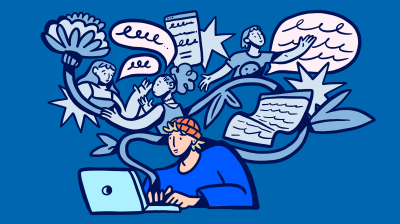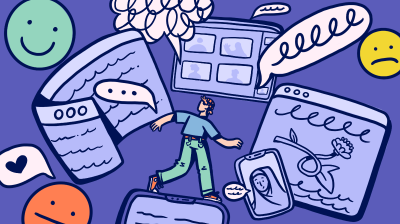How to prepare for bad mental health days
Looking after your mental health on good days can help make the bad days easier to deal with

Everyone experiences good and bad mental health days. Accepting bad days, as well as embracing good ones, can make things a lot more manageable. It’s not always easy to predict when you’re going to be feeling down, but planning for bad mental health days when you’re feeling good can make things easier when a bad day comes.
Your plan for bad mental health days
Depending on the day and what kind of commitments you have, you may need to look after yourself in different ways.
Know what you can manage
Recognise what you can and can’t do on your bad mental health days. Pushing yourself to continue with your day like normal can sometimes make things worse, particularly if you are experiencing a mental illness.
It’s okay to cancel plans or reschedule things if you need to. Be honest with your friends about how you are feeling. If you have family commitments, consider asking a relative or family friend to help explain why you may no longer be able to attend. Remember, you can choose how much you reveal.
If a manager or lecturer is expecting too much of you, try to explain to them that you are not feeling yourself today, but you’re doing your best. If you have a college or work commitment and feel like you aren’t up to it, you could try talking to your lecturer or finding out about your sick day entitlements from work.
If you frequently experience challenging mental health days due to a condition, it can be helpful to discuss with your employer the reasonable accommodations you might be entitled to. This way, when you have a difficult mental health day, you won’t need to explain everything from scratch, as you will have already established an understanding. If you don’t feel comfortable speaking to your boss yet, consider talking to another trusted person—perhaps a friendly colleague—about how you feel. Read our article on how to talk to your employer about your mental health.
Be kind to yourself
If there are commitments you can’t avoid, do your best to get through them and allow yourself the time and space to destress afterwards. You may even find it helpful to prepare your space with comfort items—sentimental objects, favourite TV shows, easy-to-make foods—so that you can begin to destress with minimal effort as soon as you return to your own environment.
Be kind to yourself when you’re struggling. Accept that you might not be as productive as usual that day, and treat yourself to a nice meal or enjoyable activity. Do whatever you can to make your day a little easier.
Have a routine
Having a routine every day—on both good and bad days—can help bring a sense of regularity to your day. If you wake up feeling down and are struggling to motivate yourself, having that structure in place might help you start your day without having to think too much about it. A routine can be really helpful even if, on some days, you don’t feel like sticking to one.
Having a routine can also mean that you are more likely to get enough sleep. Getting enough sleep and having good sleep habits is essential in looking after your mental health. For more on this, take a look at our article on combatting sleep deprivation.
While routines can be helpful for many, you find that you need to break from yours on a bad day to focus on rest and comfort instead of productivity. If possible, give yourself this time and space, knowing that this difficult period will eventually pass.
Have an action plan
A go-to list for very bad mental health days might make things easier. Lay out some guidelines for yourself as to how to look after yourself. Here are some things you could include:
- Going through your morning routine step by step
- Creating a self-care guide with ideas for taking care of yourself
- Listening to the music that makes you happy
- Watch the shows or films that make you laugh
If you have people in your life who can support you when you are having a bad mental health day, get in touch with them and let them know what you are experiencing. They may be able to help.
While you cannot directly control how you feel, you often have far more control over what you do. This is why an action plan can be so beneficial and can, over time, help you to feel better.
Practise self care
Practising self care as often as possible, even when you don’t feel like it, can help to make your bad mental health days more manageable and even less frequent. Pushing yourself and not taking enough time to look after yourself can lead to more severe or more frequent bad mental health days. It’s important to look after your mental health all the time, not just when you are experiencing illness or setbacks.
Self-care might include assigning some time to yourself just to relax or do something you enjoy, getting a change of scenery by going to visit family or friends in a different area, doing exercise or reading a book.
Build resilience
Resilience is the ability to overcome challenges and adapt after something difficult has happened in your life. It’s not a fixed trait – it is something that is constantly learned and developed. Building resilience will help you to manage better on days when you are feeling low. Read our factsheet on how to build resilience.

Eat nutritious meals
On a bad mental health day you might not feel up to preparing a proper meal but eating well is good for both your mental and physical health. Consider planning ahead and doing some batch-cooking so that you always have something to grab on a bad mental health day. Freeze a nutritious meal in a lunch-box and keep it for a day you really need it. Feeling hungry or not being able to properly nourish and hydrate yourself can worsen your mood. Check out our healthy eating section for some ideas.
Prepare emergency snacks
While eating nutritiously is important, being kind to yourself is just as crucial. If having a biscuit with your tea makes a bad mental health day a bit easier, go for it. Keep some treats set aside specifically for those tough days.
Be careful with alcohol
Drinking alcohol can affect your mood. Alcohol might affect you immediately after drinking, or leave you feeling down in the days afterwards. Try to be aware of the connection between drinking alcohol and your bad mental health days.
Do things you enjoy regularly
Sign up to a class, sport, or group that you go to on a regular basis and enjoy. On a bad mental health day you might just want to stay at home for the evening and do nothing, but doing something you enjoy might help. Exercising releases endorphins, the chemicals in your body that make you feel good. Exercise does not have to be vigorous and includes going for a short walk. Getting outside and moving your body are not cure-alls, but they can help to raise your spirits.
If you’re not in a position to exercise, you could try engaging with something creative, like a craft project, instead. This might give you something to focus on as you process and work through your difficult emotions.
Communicate with friends and family regularly
Look after your relationships with friends and family on good days. Having people close to you that you can talk to about things can really help on bad mental health days. When you’re feeling low, reach out to someone and talk about how you’re feeling. Similarly, if a friend is having a bad mental health day, try to be there for them on your good days. You could even plan to do certain self-care activities together.
If you have more bad mental health days than good, talk to someone or ask for help
If you find that your bad mental health days are becoming more frequent, lasting longer, or becoming harder to manage, consider talking to someone about it. Visit your GP and let them know how you are feeling. They may be able to refer you to a counselling service in the area. If you are in college, find out more information about the college counselling service or visit the student nurse or doctor.
Alternatively, the HSE has a National Counselling Service. You can refer yourself directly by calling the number for your region available on their website, but bear in mind that this service often has a waiting list. If you are a young Traveller and would like to speak to a dedicated community-based Traveller service, the Traveller Counselling Service offer counselling to help you support your mental health.
For more information, check out our factsheet on affordable treatment for mental health and visit our help page, which lists a variety of mental health supports and services.
Feeling overwhelmed and want to talk to someone?
- Get anonymous support 24/7 with our text message support service
- Connect with a trained volunteer who will listen to you, and help you to move forward feeling better
- Whatsapp us now or free-text SPUNOUT to 50808 to begin.
- Find out more about our text message support service
If you are a customer of the 48 or An Post network or cannot get through using the ‘50808’ short code please text HELLO to 086 1800 280 (standard message rates may apply). Some smaller networks do not support short codes like ‘50808’.






